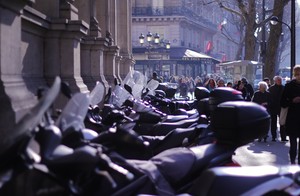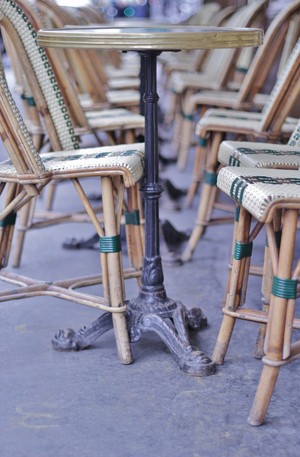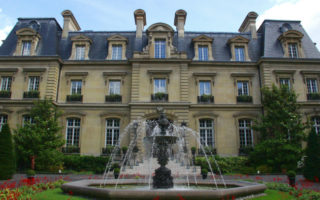Franco-British Counsel: What I Wish I’d Known the First Time

- SUBSCRIBE
- ALREADY SUBSCRIBED?
BECOME A BONJOUR PARIS MEMBER
Gain full access to our collection of over 5,000 articles and bring the City of Light into your life. Just 60 USD per year.
Find out why you should become a member here.
Sign in
Fill in your credentials below.
 “It’s difficult to say who we dislike the most,” jokes my new French friend. “I think we often say we dislike the Americans the most because we don’t like to say the word ‘English’.”
“It’s difficult to say who we dislike the most,” jokes my new French friend. “I think we often say we dislike the Americans the most because we don’t like to say the word ‘English’.”
On my first visit to France from Australia I was invited to dinner at a French home where my coat was lifted from my shoulders by an immaculately polite host. I was seated in a gorgeous living room inlaid with bookshelves and laden with matching sets of books. As dinner was prepared, I was coaxed to try a little vermouth to illustrate a story set in the country’s south. Everything was going so nicely until the conversation touched on the English. I hesitated only for a moment before deciding to ask a question that had been brewing since my arrival in France, “what is it between you and the English?” My host’s olive skin blanched, he passed a trembling hand across his forehead and the conversation fell dead.
I take to the internet to absolve myself of my ignorance. Titles such as, ‘France and England: 1,000 years of cross-channel rivalry’, line my computer screen.
I learn that it all began with a wedding between the daughter of a Norman Duke and an English King in the 11th century. Two generations later the first of a long series of offences in both directions began with the Norman Conquest of England. After this there was the Breton War, the Vexin War, The Rebellion of 1087, two more Anglo-Norman Wars, the Anglo-French War and the list goes on. In 1803 when another declaration of war between Britain and France was announced, the Napoleonic Wars began and did not end until the battle of Waterloo fought by the Imperial French army and the Anglo-Allied army. I should not have brought it up over dinner.
 Back in France and once again invited to dine with a French man, I ask what causes the most friction between the two countries now. I know that in the Anglo-world, we worry about being snubbed in Paris but I am curious to hear the French perspective or at least hoping to find out how not to embarrass myself in public. I top up my informer’s glass and remind him to keep his voice down as there is a British trio at the neighbouring table.
Back in France and once again invited to dine with a French man, I ask what causes the most friction between the two countries now. I know that in the Anglo-world, we worry about being snubbed in Paris but I am curious to hear the French perspective or at least hoping to find out how not to embarrass myself in public. I top up my informer’s glass and remind him to keep his voice down as there is a British trio at the neighbouring table.
As the conversation unfolds I discover that it is similarities as well as differences that cause both sides to bristle. The most common cause for heartache between the two cultures is the issue of manners. The French and the British share many customs of courtesy, such as skirting around an issue to avoid directness at all costs. The people of both nations will ask after your mother and your weekend and your dog before getting to the point that you haven’t paid your taxes. Another trait shared by the French and the British is that both are very reluctant to speak any other language than their own.
An Italian in Paris burst into my dorm when I first arrive demanding to know how a French proprietor could possibly justify making no effort to communicate with him in any form other than French. “In Italy,” he explodes “we would draw a picture!” I think about what I would think if someone came up to me in an English speaking country, asking me a question in a foreign language. My French friend assures me that the French are truly polite people but if someone approaches them and begins immediately to peak in English, the tone of the conversation has already been set. I take a mental note to practice, “désolé, je ne parle pas français,” in the mirror every night.
These things the French and British have in common but on the delicious topic of differences, the foremost is food. “It is very easy to brush this aside,” begins my French friend heavily, “But the biggest difference between the French and the English is that in France, conversation revolves around the table and in Britain it revolves around the bar.” I feel as though the reason for France’s legendary cultivation and sophistication has suddenly been explained. I imagine generations of dialogue playing out over long feasts and it makes sense that this would lead to a completely different culture than one arising from the pub and peanuts. “We drink just as much!” my friend hastens to add; “it’s just that we drink with a meal!” I secretly retract my revelation. But not completely.
All this talk of the French table leads the conversation to another point that I’ve always known, but never really appreciated until it was explained to me in person. “The French mind,” my friend explains, “is occupied almost entirely by thoughts of food. “While you are eating breakfast you are thinking about what you will do for lunch and while you are having lunch you are planning dinner. A French person would never think about what they are going to do for lunch one hour before lunch,” he insists, “and definitely not after doing the shopping!” It seems there is no limit to the amount of time a French person is willing to spend preparing food and they will lovingly spend the hours between meals slowly gathering ingredients.
To illustrate the omnipotence of this fact in his life, my friend tells me about the wonderful childhood hours spent with his grandfather in Toulouse, but how he always wishing he could spend time with his grandmother too. On one occasion he remembers asking her if she couldn’t join them for a little while and her incredulous reply was, “mais nous avons à manger! – But we have to eat!”
There are other differences too, which can be strange for both parties. The stiff upper English lip can seem monstrous to the French who have a much more Mediterranean approach to matters of the heart. This in turn can seem an embarrassing display of private matters to the British sensibility. The British however are more comfortable with crude humour in public and eccentricity in fashion. The French stay away from hair dye and the British flock to it like moths to a porch light. The British might call you ‘darling’ without even knowing you and the French will probably not. A French person will tell you all about their life while a British person will talk only about the weather and then offer you their couch.
All in all these differences constitute a much better state of neighbourliness than in Napoleon’s time and I’m pretty sure I can handle learning, “désolé, je ne parle pas français,” if that means I can have a pastry in peace.
More in French history, French-British


